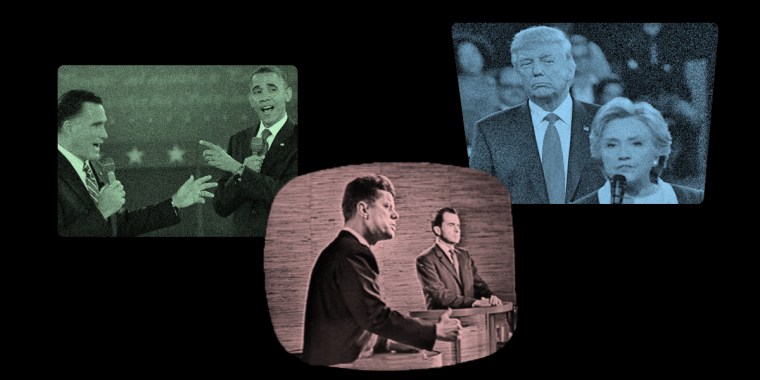WASHINGTON — The first debate between Republican President Donald Trump and Democrat Joe Biden is unlikely to change the minds of the vast majority of the American electorate who have already decided whom they support and say they can't be swayed.
But the debate could still rattle the race and rev up the electorate. A marginal impact in persuading voters could have a profound influence on the outcome if the contest comes down to a few battleground states. And some experts say presidential debates have proven to solidify impressions of candidates in ways that affect voters' behavior.
The debates could be Trump's last, best chance to reshape the contest. But that won't be easy.
Biden has enjoyed a healthy lead in polls since he became the Democratic nominee, and Trump's repeated attempts to gain ground have failed.
"Presidential debates matter less than people think. Voters don't watch to make up their minds. They watch to root for their favorites," said Jack Pitney, a professor of government at Claremont McKenna College. "After Kansas City won the Super Bowl, very few San Francisco fans thought to themselves, 'Golly, Kansas City played better, so I should be for them, instead.'"
But the contest remains close in key battleground states, like Florida and North Carolina. And some voters will be watching with an eye to making a final choice. Twenty-nine percent of Americans said in a recent NBC News/Wall Street Journal poll that debates are extremely important or very important to their votes.
'Senior moment'
The debate will feature two septuagenarians who are prone to verbal stumbles, and seeing them side by side could affect voter perceptions.
"A debate could affect the outcome if either candidate showed serious signs of mental instability or cognitive decline. The key word is 'serious.' The occasional stumble, stammer or factual error won't do it," Pitney said. "Even Reagan's senior moments in the first 1984 debate with Mondale did not change the race. I don't know what it would take, but it would be something we've never seen in the 60-year history of televised presidential debates."
Historically, debates have proven to allow a candidate to project an image, said Barbara Perry, a professor and director of presidential studies at the University of Virginia's Miller Center.
Richard Nixon's "ghastly" appearance in the first televised presidential debate in U.S. history, in 1960, gave the younger and less experienced John F. Kennedy a boost, potentially helping his popular vote victory of 0.17 percentage points, she said.
The debate could offer Trump the opportunity to make the case that perceptions of his first term are unfairly negative. Trump's job approval ratings in polls remain low, and voters frequently say they trust Biden to manage the coronavirus pandemic and health care.
But Trump continues to be more trusted than Biden on the economy, which often ranks as the top voter concern and will be a debate topic. The president may seek to use the economy to appeal to undecided voters who are worried about their pocketbooks. Biden will be trying to make up ground on the economy.
Perry said that a foreign policy stumble by President Gerald Ford in 1976 cost him credibility in what ended up being a narrow defeat and that Al Gore's sighing and "condescending speaking style" may have been detrimental in a 2000 contest that came down to a few hundred votes in Florida.
Viral moment
The debate could be another critical chance for the candidates to talk to their bases.
Perry doubted that the Trump-Biden debates will tilt the outcome. But she said Biden has more to lose if he makes a colossal error.
"Nothing will hurt Trump among his base," she said. "A disastrous misstatement by Biden or terribly poor performance might siphon just enough votes to cause his candidacy to crash, especially in a close election."
In 1992, a strong debate answer about the economy rebranded Bill Clinton "as a caring, empathic public servant, instead of a draft-dodging womanizer," and "retrenched Bush 41 as a WASPy elitist" in the minds of many voters, Perry said.
In 1988, an emotionless response from Michael Dukakis to a hypothetical question involving his wife and the death penalty "cemented his image as a nerdy policy wonk," she said.
More recent history suggests caution about the significance of debates. In 2016, polls showed Hillary Clinton handily winning all three debates, yet she lost the Electoral College. In 2012, President Barack Obama lost the first debate in surveys before recovering and winning re-election.
Now, in the social media era, the debates may be about who creates the sharpest viral moments that drive narratives and flood Facebook and Twitter feeds, where candidates are talking to their base followers, as well as seeking out the elusive undecided voters.
"Our modern-era debates are really about creating a spectacular moment or several spectacular moments that social media influencers will retweet, while avoiding being an inspiration for the newest internet meme," said Ed Lee, senior director of the Alben W. Barkley Forum for Debate, Deliberation, and Dialogue at Emory University.
Lee said the economic contrast, as it did in 2016, will matter most.
"Many people voted for President Trump in spite of his insults, insensitivities and brash bravado, not because of it," he said. "Pocketbook issues are ultimately the deciding factors."

